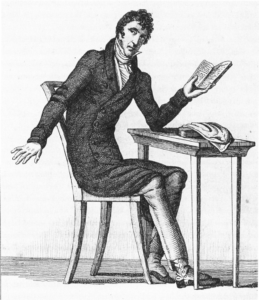Hunting song
(Poet's title: Jagdlied)
Set by Schubert:
D 521
[January 1817]
Trarah! trarah! Wir kehren daheim,
Wir bringen die Beute der Jagd.
Es sinket die Nacht,
Drum halten wir Wacht,
Das Licht hat über das Dunkel Macht!
Trarah, trarah, auf, auf!
Das Feuer angefacht!
Trarah! trarah! Wir zechen im Kreis;
Wir spotten des Dunkels der Nacht!
Des Menschen Macht,
In freudiger Pracht,
Die Qual verhöhnet, des Todes lacht!
Trarah, trarah, auf, auf!
Die Glut ist angefacht!
Tally-ho! Tally-ho! We are on our way home, –
We are bringing what we have caught on the hunt! –
Night is falling,
So we are going to stay up;
Light has power over darkness!
Tally-ho! Tally-ho! Up, up!
Get the fire going!
Tally-ho! Tally-ho! We are sitting in a circle having a drink;
We scorn darkness and night!
The power of men,
In joyful splendour,
Derides suffering and laughs at death! –
Tally-ho! Tally-ho! Up, up!
The spark has set the fire going!
All translations into English that appear on this website, unless otherwise stated, are by Malcolm Wren. You are free to use them on condition that you acknowledge Malcolm Wren as the translator and schubertsong.uk as the source. Unless otherwise stated, the comments and essays that appear after the texts and translations are by Malcolm Wren and are © Copyright.
☙
Themes and images in this text:
Circles Drinking songs Fire Home (Heimat) Hunters and hunting Laughing Night and the moon
The adrenaline is pumping. They are on a high. The hunt has been a success and all the participants are on their way home in defiant mood. Having succeeded in overcoming the dangers of the chase and the risk of being gored or trampled to death they are ready to take on any new challengers. They defy darkness and night itself.
This is how it must have been through uncharted thousands of years of hunter / gatherer society. The hunt has not merely provided food and exercise, it has served to create a fellowship of peers and raise morale. It has provided reassurance that risks can be overcome and that human beings can be active in controlling and adapting to their environment. They deride suffering and laugh in the face of death. All of this is symbolised in the fire that they light, whose primary purpose is perhaps not to cook the meat they have caught but to assert human dominion over the natural order. Its heat banishes the cold of evening; its light extinguishes night itself. Forget sleep. Drink. Sing. This is what it is to be alive.
☙
Original Spelling Jagdlied Trarah, trarah! Wir kehren daheim, - Wir bringen die Beute der Jagd! - Es sinket die Nacht, Drum halten wir Wacht; Das Licht hat über das Dunkel Macht! Trarah, trarah! Auf, auf! Das Feuer angefacht! Trarah, trarah! Wir zechen im Kreis; Wir spotten des Dunkels, der Nacht! Des Menschen Macht, In freudiger Pracht, Die Qual verhöhnet, des Todes lacht! - Trarah, trarah! Auf, auf! Die Gluth ist angefacht!
Confirmed by Peter Rastl with Wanda, Königin der Sarmaten. Eine romantische Tragödie mit Gesang in fünf Akten. Von Friedrich Ludwig Zacharias Werner. Tübingen, 1810. In der J. G. Cotta’schen Buchhandlung, pages 22&24; and with Theater von Friedr. Ludw. Zachar. Werner. Vierter Band. Wörtlich nach der Original-Ausgabe. Wien, 1813. Im Verlage bey Joh. Bapt. Wallishausser, pages 242&244.
The poem appears in Werner’s drama Wanda, Königin der Sarmaten at the end of act 1 as Chor der Ritter und Reisigen (chorus of the knights and horsemen).
To see an early edition of the text, go to page 294 [306 von 416] here: http://digital.onb.ac.at/OnbViewer/viewer.faces?doc=ABO_%2BZ168764709


